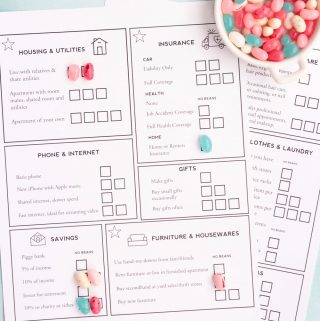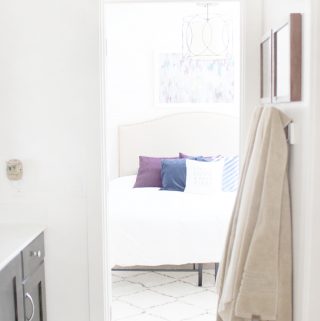I have to admit that I feel really inadequate writing a series on budgeting. I haven't had any formal training on budgeting and I am by no means an expert. My financial knowledge is derived mainly from what my parents taught me, in correlation with a few college classes and lots of books. Also, my super smart husband majored in finance and I have learned a lot through our journey together so far.
That being said, most of what I have to say on the subject of budgeting is simply my ideas and opinions. I wouldn't even think to write those, were it not for the fact the ideas and opinions of others have helped me so much on my own financial journey. I feel like even though all of our circumstances, and therefore our budgets, are different, the principles are the same.
Live simply. Make smart choices. Save first. No debt.
So, the next thing we need to do is write up a budget. The idea behind this is really basic. Take your gross monthly income and then subtract from it all your mandatory expenses. This is the point where we decide how much we want to save each month. If you have debt you should have a plan to pay it off and this might supersede saving for you. Whether it does or not, paying off debt should be a high priority in your monthly budget. After your mandatory expenses have been taken out, and you have set aside the amount you want/need to save, you can subtract your voluntary expenses like cable TV and cellular data plans. Then, take whatever money remains and divide it between your remaining expenses (gasoline, food, etc.). If you are lucky enough to have a balance this is extra "fun money" and can be divided however you see fit into categories like dining out, entertainment, etc.
If your monthly income varies or you have commission based income you may think budgeting is impossible. Not so. If your income varies but not by much (like if you are paid hourly but work roughly the same hours) budget off of a worse case scenario. Gather your pay stubs for the last 4-6 months and see what the lowest income earning month was. Use that number to base your budget off of. That way, even if you work a bit less than you usually would you will still have money to cover your expenses. If your income varies greatly (as in you have no idea when your next paycheck will be) here are a few ideas.
1) Live off of the money you made the previous month. I first learned of this theory through YNAB and I think it is a really good one. What it means is that if in January you made $1,000 then that is the amount you have to spend in February. If in February you make $0.00 then you will pay your mandatory bills and then largely be living off of food storage etc. This leads me to my next point.
2) Establish an emergency fund and food storage. If you read this post then you know that this is a big part of my personal financial plan. An emergency fund and food storage is important for everyone, but it is especially so if you are an irregular income budgeter. I was raised in this type of a household as my dad is a realtor. Not only did my parents have an emergency fund and an extensive food storage, but their food storage reached to include many other items so that during the slow months we always had things like toothpaste, conditioner, dishwasher detergent, toilet paper etc. Not only is this the fiscally wise thing to do, but it will relieve a great amount of stress for the providers in the home.
3) If you don't think that #1 will work for you, and assuming you have built up #2, another idea is to contrive your budget like I first described in this post. Make a good, tight budget that you feel like you can be proud of living, and one that historically you usually make enough to cover. Then, on the months when you don't make enough to cover your expenses you reach into your emergency fund. However, you are then not allowed to spend any fun money until your emergency fund is replenished.
We will talk more about irregular income budgeting and establishing emergency funds later, but hopefully that will give you some basic ideas.
Getting this sort of "raw budget" out of the way will enable you to start living your budget right away and we can work out the details and schematics next.
I made a budget work-up sheet in case anyone needed one. If you want to see if it works for you, you can view and download it here. If you have any questions or comments I would love to hear them. I hope this helps a little. Thanks for coming along on this financial journey with me.








Leave a Reply